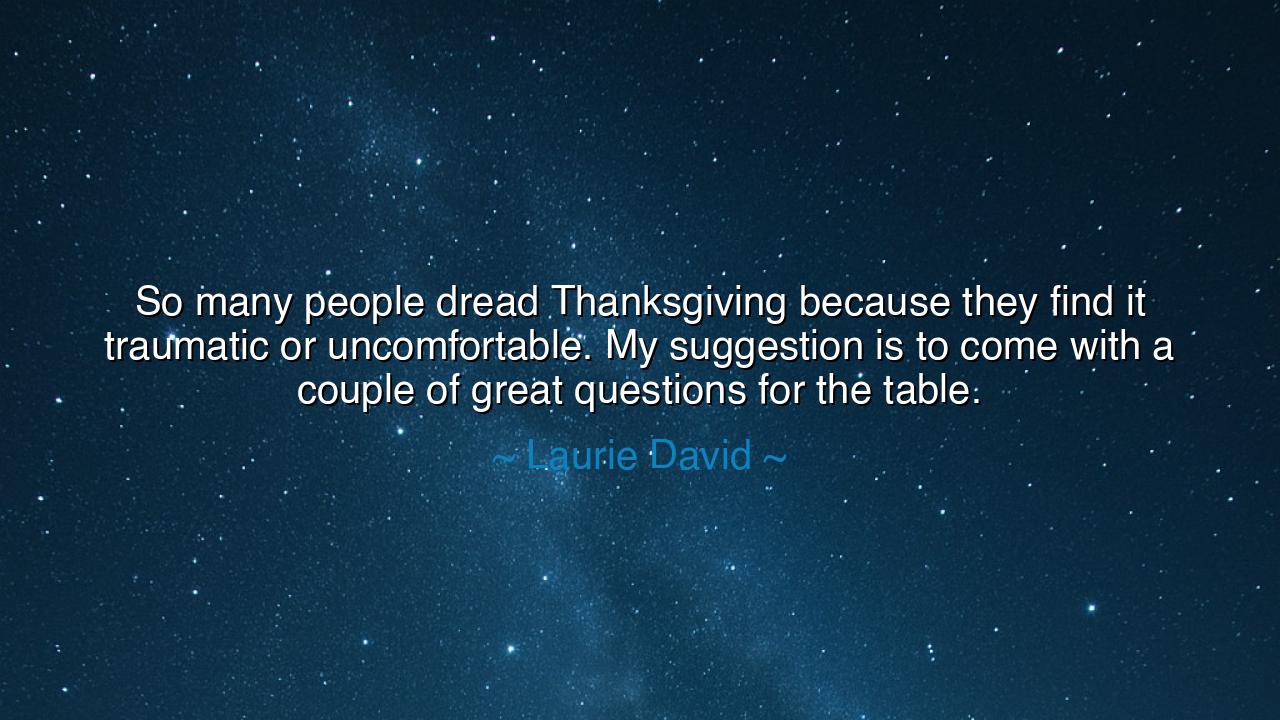
So many people dread Thanksgiving because they find it traumatic
So many people dread Thanksgiving because they find it traumatic or uncomfortable. My suggestion is to come with a couple of great questions for the table.






The words of Laurie David—“So many people dread Thanksgiving because they find it traumatic or uncomfortable. My suggestion is to come with a couple of great questions for the table.”—shine with wisdom born of compassion. She acknowledges a truth many hide: that gatherings meant for joy can sometimes stir sorrow, conflict, or unease. Yet she offers a simple remedy rooted in the oldest traditions of humanity: the power of conversation, of guiding words that open hearts instead of closing them. In her counsel, we hear the echo of the ancients, who knew that at the table, as much as in the temple, lives could be healed through dialogue.
From the earliest days, the feast was not merely about food but about communion—about speaking and listening. The Greeks held symposia, gatherings where wine was shared and questions of philosophy, virtue, and love were asked of all present. The Hebrews spoke blessings and retold sacred stories around the Passover meal, teaching each generation through dialogue. Even in Rome, the banquets of statesmen and philosophers were not only about bread and meat, but about questions—the exchange of wisdom, the testing of thoughts, the weaving of community. Laurie David’s advice is nothing new, but rather a return to this ancient art: that a well-placed question can turn a table of tension into a circle of meaning.
History offers a vivid mirror. Consider Franklin D. Roosevelt, who in the depths of the Great Depression often welcomed guests to his family table. He did not allow despair or division to dominate the meal. Instead, he asked questions—sometimes about books, sometimes about the future, sometimes about the personal lives of his guests. These questions drew out laughter, stories, and connection, even in dark times. In doing so, he transformed meals from mere consumption into a space of healing and unity. Laurie David points us toward the same path: the right words can redeem even a strained Thanksgiving table.
The meaning of her counsel also lies in its humility. We cannot always control who gathers at our table, nor the wounds they bring with them. But we can shape the tone of the feast. A single question—“What are you grateful for this year?” or “What memory makes you smile the most?”—can redirect the flow of conversation from bitterness to hope, from quarrel to storytelling. Where accusations divide, questions invite. Where silence wounds, questions heal. Thus, she teaches us that the table is not a battlefield, but a school of love, if only we dare to guide it with gentle wisdom.
There is also profound symbolism in her suggestion. Questions are bridges. They honor others by seeking their voice. They create space for every person, from the elder with decades of memory to the child with simple wonder. At a feast like Thanksgiving, where the ritual is meant to bind generations together, questions ensure that no one is left out, no voice silenced. In asking, we give the gift of dignity. In listening, we give the gift of love.
The lesson for us is clear: if the table is to be sacred, it must be guided by words that uplift rather than words that wound. Do not come to the feast armed with grievances or silence, but prepared with questions that call forth gratitude, memory, and joy. Think of yourself not merely as a guest, but as a steward of the gathering. By offering the right question, you may turn awkward silence into laughter, anger into remembrance, distance into intimacy.
Therefore, let your actions be these: before you gather, prepare not only the food but also your heart and your words. Bring with you a question that can spark gratitude, wisdom, or delight. Offer it with kindness, and then listen with humility. Teach your children to do the same, so that they may learn the art of conversation as a form of love. In this way, every table, no matter how heavy with history, may become lighter with grace.
Thus, Laurie David’s words endure as more than advice for a single holiday—they are a reminder of the eternal truth: the feast is not only what we eat, but what we say. And when the right questions are asked, the table becomes not a place of dread, but a sanctuary of connection, a temple of gratitude, and a living memory of love.






AAdministratorAdministrator
Welcome, honored guests. Please leave a comment, we will respond soon